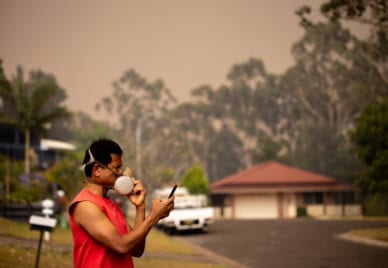
Aggregating and Integrating Data on Health Outcomes Associated with Bushfires at a National Scale
Exploreabout Aggregating and Integrating Data on Health Outcomes Associated with Bushfires at a National Scale
Australia’s food sector suffers from segmented (siloed) data that is often inaccessible or incompatible to users. A digitally connected food sector is modelled to increase Australian agriculture’s gross value of production (GVP) by 25% and will also increase fisheries and aquaculture sector GVP by 44%.
This project will create a national data platform to safely share fishing and aquaculture data. The platform will unlock the value of unused or underutilised fishing and aquaculture data through best practice standardisation, ingestion, security, storage, cataloguing and analysis.
This project will enable food producers to safely and confidently adopt new technologies, participate in research, and share their data, thus improving the efficiency and quality of agriculture production.
The project will deliver a digitised Data Sharing Agreement template, incorporating best practice for data management and sharing. Additionally, the project will provide training materials and a certification against the Australian Farm Data Code developed by the NFF.
The ability of Australian agrifood businesses to trade globally is dependent on the assurances related to the claims and attributes of the products being exported.
This project will create a fundamental and underpinning data resource which can enable evidence-based assurances of agricultural product’s credentials including origin, production method and quality. The project will federate significant, yet disconnected, public-good data resources of landscape and environmental stable isotopes (i.e. carbon, hydrogen, nitrogen, oxygen, sulphur, strontium and lead) to connect rich databases in ways that are currently out of reach or beyond the realms of a single organisation.
Antimicrobial resistance (AMR) is one of the greatest threats to health, food and agribusiness, water, and waste sectors in this century. This project will work with agribusiness partners to develop a nationwide data asset through building the digital foundations for collecting and collating antimicrobial use (AMU) and AMR data.
This will improve agribusinesses’ preparedness for AMR events by providing integrated digital transformation solutions for AMU and AMR data that helps agribusinesses respond to the development and spread of AMR and minimises its consequences on Australian food security.
The agriculture sector faces increasingly challenging and variable environments. This project will enable research into the relationships between crops and our varying environment using time series data on growth and performance and local conditions, such as weather, soils, pests etc.
The project will use a set of established Australian research farms and surrounding agricultural/ ecological research sites to develop a framework, standards and best-practice recommendations for FAIR publication of heterogeneous data, combined with integration pipelines and user access tools for scale-appropriate data cubes to explore all aspects of crop development.
The ability to report on apparent consumption of key foods and nutrients will provide policymakers and researchers with invaluable information to contribute to food security research and inform policy settings.
Building on the Apparent Consumption of Selected Foodstuffs (ACSF) collection recently established by the Australian Bureau of Statistics (ABS), this project will report on the apparent consumption of key foods and nutrients in small geographical areas. It will also provide further enhancements to improve the timeliness and comprehensiveness of the data.
On any given day, over half a million Australian households experience food insecurity, making it an extremely serious health and welfare issue facing our country. This project will integrate food relief distribution dataset to provide a comprehensive map of the incidence and depth of food insecurity in Australia, along with the current provision of food relief within the community.
This will enable the food relief sector to target unserved and underserved demand by informing their strategic and operational planning and providing meaningful effectiveness measures, and will help to achieve enhanced public understanding via a more current and nuanced picture of the issue of food insecurity.
Mud crabs (Scylla spp.) are a valuable commercial fishery in Australia. However, their high demand and price make them prone to illegal fishing and black marketing. Preventing illegitimate harvesting and trade of seafood is a high priority for state governments across Australia.
The project will build a digital traceability data infrastructure for the Australian seafood sector, using the mud crab supply chain as a model. The developed traceability platform will improve traceability data systems to allow end-to-end tracking of individual mud crabs through the supply chain and generate multi-stakeholder benefits. This project will be usable and transferable to a wide range of research applications, food commodities and supply chains.
Bee deaths at recent pollination events along Australia’s New South Wales and Victorian states border have raised concerns regarding the potential negative impact of chemical use on beehive health. This project will develop an integrated traceability system to help apiarists better understand the relationship between chemical use in orchards and beehive health.
The project will develop a coordinated approach to tracing chemical spray data and align that data with the presence of a hive at pollination. The system can also support orchardists’ and apiarists’ pest and disease responses in the event of an outbreak, allowing for fast and accurate delimitation and responses for developing national traceability systems.